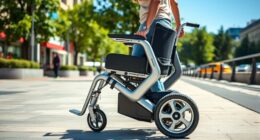When planning outings with Parkinson’s, organize your medications and keep extras handy to prevent gaps. Notify transportation services about mobility needs and choose accessible routes to avoid obstacles. Research rest stops, medical facilities, and accessible restrooms along your route. Carry a list of emergency contacts and explain your symptoms clearly to companions or helpers. Prioritize comfort, schedule activities around medication peaks, and incorporate rest to prevent fatigue. Want more tips? Keep exploring for all-encompassing guidance on safe travel with Parkinson’s.
Key Takeaways
- Organize and carry medications with extra doses, reminders, and a detailed list to prevent gaps during outings.
- Prepare accessible transportation and routes that minimize obstacles and support mobility needs.
- Research accessible restrooms, medical facilities, and plan activities around medication peaks.
- Carry emergency contacts, medical info, and communicate needs clearly to travel companions and providers.
- Schedule rest periods, use mobility aids, and choose suitable clothing to enhance safety and comfort throughout the outing.

Traveling with Parkinson’s can seem intimidating, but with proper planning, you can enjoy your trip while managing your symptoms effectively. The key is to prepare ahead of time, especially when it comes to medication management and mobility aids. Making sure you have your medications organized and accessible is crucial. Pack extra doses of your medications in case of delays or emergencies, and keep them in a carry-on bag rather than checked luggage. Set alarms or reminders on your phone to help you stick to your dosing schedule, preventing fluctuations in symptoms or medication gaps. It’s also helpful to carry a list of your medications, dosages, and prescribing doctor’s contact information in case you need assistance during your trip.
Proper planning and medication organization are key to traveling safely with Parkinson’s.
Mobility aids play a vital role in maintaining independence and safety while traveling. Whether you use a cane, walker, or wheelchair, make sure your mobility aids are in good condition and appropriate for your destination. If you’re flying, notify the airline beforehand about your mobility needs so they can provide assistance or accommodations. When traveling through airports, stations, or busy streets, take your time and plan routes that minimize obstacles or crowded areas. Consider bringing a lightweight, portable mobility aid that’s easy to carry or store when not in use. Additionally, wearing comfortable shoes and clothing can help reduce fatigue and improve stability.
Before setting out, research your destination thoroughly. Identify accessible restrooms, medical facilities, and transportation options that can accommodate your needs. Carry a small bag with essentials like water, snacks, a hat, and sunscreen to stay comfortable during outings. It’s also wise to schedule activities during times when your medication effects are at their peak, usually shortly after taking your doses, to make sure maximum symptom control. Rest periods are equally important, so don’t overexert yourself—listen to your body and take breaks as needed. Incorporating anti-aging ingredients found in eye patches, such as collagen and hyaluronic acid, can help refresh the eye area after a long day of traveling.
Communication is another vital aspect. Carry a card or note explaining your condition, especially if you experience symptoms like speech difficulties or tremors that might cause concern. Inform your travel companions about your needs and how they can assist if necessary. Staying connected with your healthcare provider before and during your trip can provide peace of mind and quick advice if symptoms worsen or emergencies arise. With thorough planning, you can reduce the stress of traveling and focus on enjoying new experiences while effectively managing Parkinson’s symptoms.
Frequently Asked Questions
How Can I Manage Medication Schedules During Travel?
You should plan your medication timing carefully by bringing enough medication for your trip plus some extra in case of delays. Carry your prescriptions and visit local travel pharmacies if needed. Use a pill organizer to keep track of doses and set reminders on your phone. Always carry your medication in your hand luggage to avoid loss or delays, ensuring you stay on schedule and manage symptoms effectively during travel.
What Should I Do in Case of a Parkinson’s Emergency Abroad?
Imagine your journey hitting a sudden storm—you stay calm and act swiftly. In a Parkinson’s emergency abroad, prioritize emergency preparedness by knowing local medical resources and having medical info ready. Contact local emergency services immediately, and keep your medication list and doctor’s contact handy. Reach out to your healthcare provider for guidance. Staying composed and prepared helps you navigate the storm safely, ensuring you get the help you need.
Are There Specific Travel Insurance Options for Parkinson’s Patients?
Yes, there are specific travel insurance options for Parkinson’s patients. You should look for policies that offer thorough coverage options, including medical emergencies, medication needs, and repatriation. Always compare plans to guarantee they accommodate your condition, and read the fine print to understand what’s covered. It’s essential to choose travel insurance tailored to your health needs, so you can travel with peace of mind knowing you’re protected abroad.
How Do I Handle Mobility Aids While Traveling?
Did you know that over 60% of Parkinson’s travelers find managing mobility aids challenging? When handling your mobility aids, always pack assistive device storage that’s secure and easily accessible. Keep up with mobility aid maintenance by checking batteries, brakes, and fittings before your trip. During travel, handle your aids gently, and consider carrying a spare if possible. This ensures safety, convenience, and peace of mind throughout your journey.
What Are Tips for Reducing Travel-Related Stress and Fatigue?
To reduce travel-related stress and fatigue, focus on relaxation techniques like deep breathing or listening to calming music. Pack essentials such as snacks, water, medications, and comfortable clothing to stay energized and comfortable. Plan your itinerary with plenty of rest breaks, and stay flexible to adapt to unexpected changes. Taking these steps helps you stay relaxed, manage fatigue better, and enjoy your trip more fully.
Conclusion
So, next time you plan an outing with Parkinson’s, remember: your trusty GPS might need a little extra help, and maybe a snack or two will keep the tremors at bay. Think of it as a wild adventure—like steering a jungle gym blindfolded, but with a map. Embrace the chaos, stay prepared, and turn every outing into a hilarious story you’ll laugh about later. After all, life’s too short not to dance to your own unpredictable rhythm!









